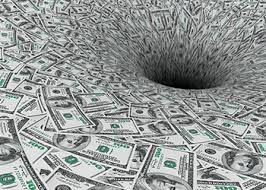June 5 – Brace yourselves, Premier League bosses. Extrapolating the forecast in yesterday’s Tottenham statement to gauge the possible league-wide revenue loss attributable to Covid 19, does not make pretty reading.
By my reckoning, if the North London club’s estimate that its revenue loss for the period to June 2021 “may exceed £200 million” turns out to be well-founded, then the aggregate revenue loss experienced by all English top-tier clubs over the same period could be as much as £2.2 billion.
These are the calculations and assumptions I have made.
Spurs revenue in 2018-19 totalled fractionally over £460 million. Let’s say that if the pandemic had not hit, it might have achieved £500 million in 2019-20 and the same the year after.
Let’s also assume, though it is not entirely clear, that that Spurs estimate covers the period from March 2020 to June 2021, so 16 months; a year and a third.
Spurs might ordinarily have been expecting something like £670 million in revenue over this period. So its estimate that approximately £200 million could be lost to coronavirus appears to equate to a projected revenue loss of around 30%.
Now, assume that the rest of the Premier League loses revenue at the same rate – I actually suspect that the Spurs percentage might be one of the higher ones because its new stadium enables it in theory to host such a wide range of events, but that is merely a hunch – what does 30% of the previously-expected aggregate revenues of all 20 clubs amount to?
Well, 2018-19 revenue added up to £5.156 billion, according to Vysyble. Let’s surmise that this might have crept up to £5.4 billion in 2019-20 in a world with no pandemic, and to £5.5 billion in 2020-21.
That suggests overall revenue that might have reached £7.3 billion in the relevant 16-month period. Take away 30% of that and the figure you get is £2.19 billion.
The Premier League is an unequal world, with annual revenue before the pandemic ranging from around £120 million at the bottom of the tree to £600 million-plus (for Manchester United) at the top. But £2.19 billion equates broadly to £100 million of potentially lost revenue per club.
Yes, some costs will have fallen while the season has been in suspension, but these are likely to have been fairly marginal. Why? Because player wages account for such a high proportion of overall expenses and, in a strongly unionised environment, these cannot easily or quickly be cut.
Now consider that Premier League clubs lost on average £7 million each at the pre-tax level in 2018-19. Once again, this was not evenly spread; Spurs have in fact been the most profitable club in the league for both the last two years for which full information is available. Two clubs lost in excess of £100 million! http://www.insideworldfootball.com/2020/06/01/spurs-liverpool-still-top-premier-league-profits-table-bubble-burst/
Well, you do not have to be Nostradamus to foresee that revenue losses of a scale that Tottenham’s Daniel Levy appears to regard as possible would cause an almighty financial shock in the world’s richest national club football league.
To put it mildly, anyone still hoping that England’s wealthiest clubs will somehow bail out those lower down the pyramid is probably whistling in the wind.
Of course, most of these big clubs have fabulously wealthy owners who would certainly still be capable of financing a re-set. But these individuals did not, by and large, rise to their elevated status in the world by throwing their cash around. Any such re-set is likely to carry a cost.
Somehow reducing the peril of relegation – strictly theoretical as it might nowadays be for the Big Six – is one possible quid pro quo that springs to mind. Live broadcast of all matches, leading perhaps to even fewer games kicking off at 3pm on a Saturday, and virtually none beginning simultaneously, is another. A period of wage stagnation, though perhaps not for the very biggest stars, might also be on the cards. Indeed, with disruptive PE investors now having taken a foothold in the game, the changes eventually triggered by this shock could end up being considerably more profound.
To summarise: this new Spurs estimate of potential Covid 19-related revenue losses may well turn out to be a worst-case scenario, for a number of reasons. But even if this is not the financial equivalent of the meteorite that wiped out the dinosaurs, it seems almost impossible to imagine the game simply dusting itself off and moving on much as before.
Contact the writer of this story at moc.l1751666965labto1751666965ofdlr1751666965owedi1751666965sni@n1751666965ewo.d1751666965ivad1751666965

